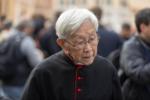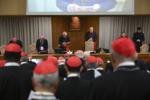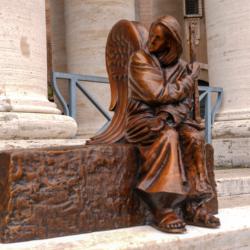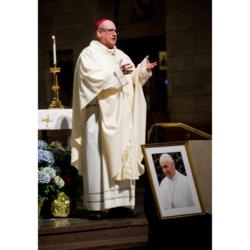Convocation speaker echoes Emmanuel College’s social justice mission
Paul Farmer, world-renowned humanitarian, physician and anthropologist, was the keynote speaker at Emmanuel College’s Academic Convocation Oct. 3, offering insight into his many years of treating the poor in such places as Haiti, Rwanda, Peru and Siberia. More than 1,500 students, faculty, administration and friends of the college gathered in the Jean Yawkey Center for the address and to see Farmer receive an honorary doctor of humane letters degree, which was conferred by Emmanuel president Sister Janet Eisner, SND and board chair C. Michael Daley.
Farmer cited the importance of the undergraduate experience saying, “Everything I am doing now and have done for a long time, from being a physician to being a medical anthropologist to going to Haiti to becoming interested in public health and equity issues, started when I was an undergraduate.”He also noted the synergy of his work and the Catholic mission of social justice.
Pulitzer Prize-winner Tracy Kidder’s book, “Mountains Beyond Mountains: The Quest of Dr. Paul Farmer, A Man Who Would Cure the World,”is required reading for all incoming freshmen as part of Emmanuel’s new First Year Experience Program. The book focuses on Farmer’s travels around the world to raise awareness about infectious diseases in impoverished countries.
In her introduction of Farmer, Sister Janet noted, “In this Catholic liberal arts and sciences college, our students are urged to form a strong social conscience and to give generously to others, especially the poor.”
She continued, “Dr. Paul Farmer is someone who exemplifies many of the qualities and values that we endorse at Emmanuel College.”
Farmer is Presley Professor of Medical Anthropology in Harvard Medical School’s Department of Social Medicine and an attending physician in infectious diseases at Brigham and Women’s Hospital. He is also a founding director of Partners in Health, an international charity organization that provides health care services to the poor. He has authored or co-authored more than 100 scholarly publications, based in large part on his clinical, teaching and human rights initiatives.


















